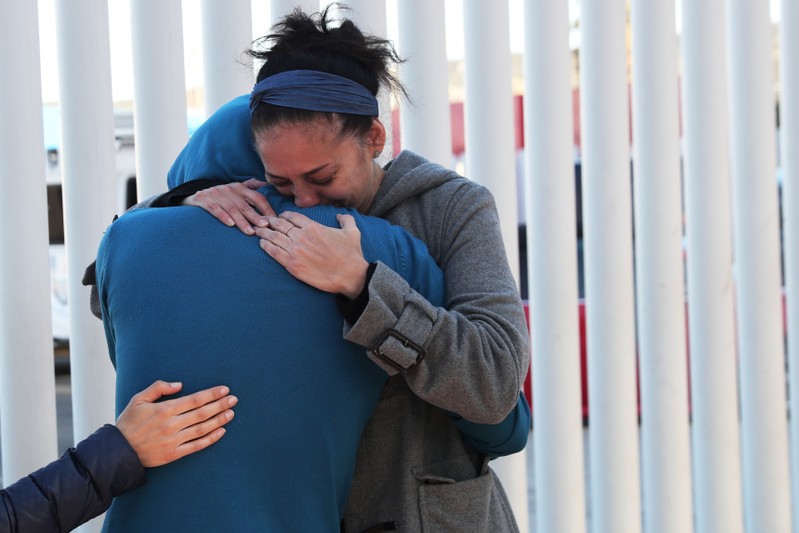
People embrace near the Chaparral border crossing in Tijuana, Mexico, January 25, 2019. REUTERS/Shannon Stapleton
January 25, 2019
By Julia Love
TIJUANA, Mexico (Reuters) – Migrant shelters in Mexico’s northern border city of Tijuana are filled to overflowing with Central Americans fleeing poverty and violence and unable to cope with an expected influx of U.S. asylum seekers due to be dispatched to the city from the United States, activists and local shelter officials said on Friday.
The policy dubbed the Migrant Protection Protocols first announced on Dec. 20 by the administration of President Donald Trump will return non-Mexican migrants who cross the U.S. southern border back to wait in Mexico indefinitely while their asylum requests are processed in U.S. immigration courts.[nL1N1ZO1QK]
Mexican Foreign Ministry spokesman Roberto Velasco said the United States was to send the first group of 20 asylum seekers back to its territory later on Friday through Tijuana.
Asylum seekers have traditionally been granted the right to stay in the United States while their cases were decided by a U.S. immigration judge, but a backlog of more than 800,000 cases means the process can now take years.
Now, the U.S. government says migrants will be turned away with a “notice to appear” in immigration court. They will be able to enter the United States for their hearings but will have to live in Mexico in the interim. If they lose their cases, they will be deported to their home countries.
“Shelters are at capacity and we can’t receive migrants that are being deported or (Mexican) nationals that are passing through the city. Let’s hope this doesn’t happen,” said Jose Maria Garcia, who runs the Juventud 2000 shelter in Tijuana.
The U.S. policy shift is aimed at curbing the increasing number of families arriving mostly from Central America who say they fear returning to their home countries due to threats of violence. The Trump administration says many of the claims are not valid.
The program will apply to arriving migrants who ask for asylum at ports of entry or who are caught crossing illegally and say they are afraid to return home.
Immigration advocates fear Mexico is not safe for migrants who are regularly kidnapped by criminal gangs and smugglers, and have raised concerns that applicants will not be able to access proper legal counsel to represent them in U.S. courts.
Twenty-four year-old Danis Lazaro, who left his native Guatemala five months ago with his two daughters, aged 6 and 7, said he was concerned about the new U.S. policy.
“It doesn’t seem fair to me. It’s safer for us on the other side (of the border),” he said.
It is unclear how Mexico plans to house what could be thousands of asylum seekers for the lengthy duration of their immigration proceedings. Some Mexican border towns are more violent than the cities the Central Americans left behind.
“Asylum seekers from Central America are fleeing unspeakable violence and their journeys to the United States are dangerous and harrowing,” said Betsy Fisher, policy director for the International Refugee Assistance Project. “For many of them, Mexico is not a safe place to stay.”
The administration of President Donald Trump, who has described Central American migrants as a danger, says it is relying on a U.S. law that allows migrants attempting to enter the United States from a contiguous country to be removed to that country.
But the policy will likely be challenged in court since claiming asylum is protected under both international and U.S. law.
“The Trump administration’s war on asylum seekers continues. There is no doubt that, unless blocked, this policy will lead to even more chaos and further erode our nation’s core values,” the Southern Poverty Law Center said in a statement.
Several of Trump’s signature immigration policies, including some attempting to reduce asylum applications, have been halted by U.S. federal courts.
(Reporting by Julia Love in Tijuana; Additional reporting by Lizbeth Diaz in Mexico City, Mica Rosenberg in New York and Kristina Cooke in San Francisco; Writing by Anthony Esposito; Editing by Daniel Flynn and Tom Brown)

